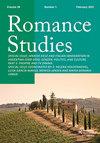La Construcción del yo en el Exilio: El público argentino de Rosa Chacel
IF 0.2
3区 文学
0 LITERATURE, ROMANCE
引用次数: 3
Abstract
ABSTRACT The identity-building process of exiled republican writers moves in a field of tension between Spain and the host country. The self-image Rosa Chacel crafted in the short essays published during her Argentinian exile (1940–1959) and collected in the volume La lectura es secreto (1989) exemplifies that tension. On the one hand, there is a strong sense of identification with Ortega y Gasset’s generation and with the Spanish past. On the other, the scene from where the essays are enunciated is situated in the Argentinian context of the present: based on the reading experiences of the day in Argentina, a dialogic relationship with the Argentinian public is created. Contrary to what the title of the collection La literatura es secreto suggests — a reference to the solitary character of reading — the dialogic dimension of reading is reflected in the essays and becomes the mechanism through which Chacel rebuilds — between the Spain of the past and the Argentina of the present — her exiled self.流亡中的自我建构:罗莎·查塞尔的阿根廷观众
摘要流亡共和国作家的身份建构过程是在西班牙和东道国之间的紧张关系中展开的。罗莎·查塞尔(Rosa Chacel)在阿根廷流亡期间(1940–1959年)发表的短文中塑造的自我形象,并被收录在《La lectura es secreto》(1989年)一书中,体现了这种紧张关系。一方面,人们对奥尔特加和加塞特这一代人以及西班牙的过去有着强烈的认同感。另一方面,这些文章的阐述场景是在阿根廷当下的背景下进行的:基于当时在阿根廷的阅读经历,与阿根廷公众建立了对话关系。与《La literatura es secreto》一书的标题所暗示的——指的是阅读的孤独性——相反,阅读的对话维度反映在文章中,并成为查塞尔在过去的西班牙和现在的阿根廷之间重建流亡自我的机制。
本文章由计算机程序翻译,如有差异,请以英文原文为准。
求助全文
约1分钟内获得全文
求助全文

 求助内容:
求助内容: 应助结果提醒方式:
应助结果提醒方式:


